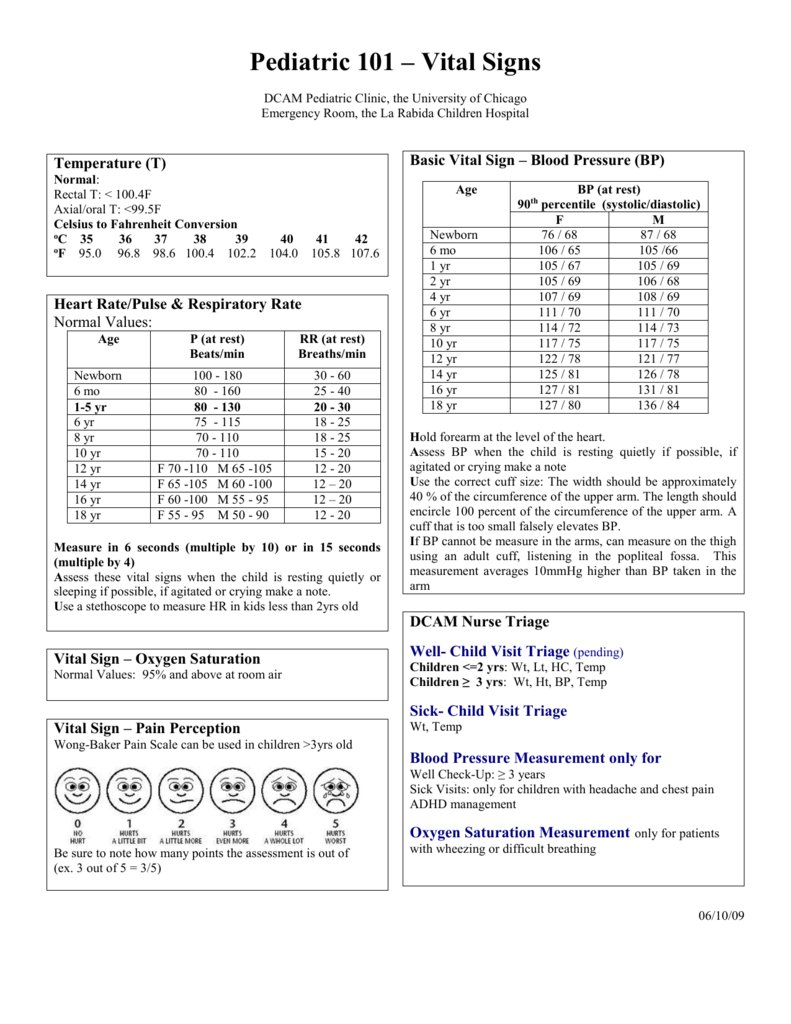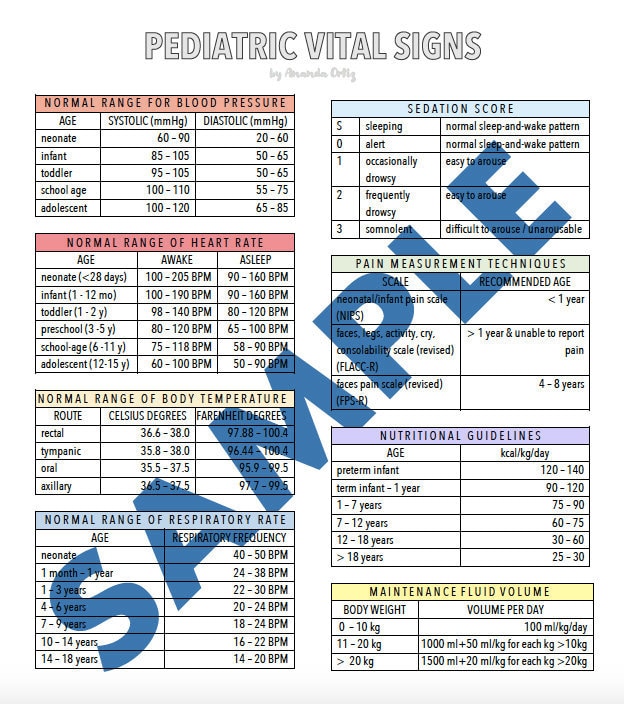Printable Pediatric Vital Signs Chart
Printable Pediatric Vital Signs Chart - Health record tracker for adults. If you buy books linked on our site. Web $9.50 add to cart description the aha’s pals digital reference card is a convenient, quick reference tool that healthcare professionals can access during the pals course and in a variety of healthcare settings. Web the four basic vital signs are: Blood pressure (systolic/diastolic) systolic blood pressure is the upper number of a blood pressure. Full text ↑ davies p, maconochie i. Patient presents with an arrhythmia. 2.1 sbp rule of thumb; Click any medical form to see a larger version and download it. This is measured in beats per minute (bpm). Pressure when the ventricles are at rest. The relationship between body temperature, heart rate and respiratory rate in children. Basic and advanced life support. Full text ↑ davies p, maconochie i. Types of digital thermometers for use by age 6 table 2: The most common vital signs recorded on each chart include heart rate, respiratory rate, blood pressure, oxygen saturation, and body temperature. What are normal ranges of vital signs for. Click any medical form to see a larger version and download it. From boyle heights to the halls of power. Healthcare providers check these during examsto get a snapshot of your. This is measured in beats per minute (bpm). (1 st percentile) normal range. Basic and advanced life support. Click any medical form to see a larger version and download it. 1.1 pediatric vital signs chart [1] 1.2 newborn vital signs [3] 2 systolic blood pressure. Health record tracker for adults. Healthcare providers check these during examsto get a snapshot of your child’s overall health. The most common vital signs recorded on each chart include heart rate, respiratory rate, blood pressure, oxygen saturation, and body temperature. Pediatric advanced life support (pals) see also: Pediatric respiratory rate and heart rate lower limit, normal range, and upper limit. Web a pediatric vital signs chart includes important data for assessing a child’s health and development. Normal respiratory rate (beats/minute) as per the pediatric advanced life support (pals) guidelines. By zev yaroslavsky and josh getlin. Pressure when the ventricles are at rest. Types of digital thermometers for use by age 6 table 2: Web a pediatric vital signs chart includes important data for assessing a child’s health and development. 1.1 pediatric vital signs chart [1] 1.2 newborn vital signs [3] 2 systolic blood pressure. (1 st percentile) normal range. Vital signs cause patient to become symptomatic with chest pain, shortness of breath, or confusion. What are normal ranges of vital signs for. (10 th to 90 th percentile) The relationship between body temperature, heart rate and respiratory rate in children. Full text ↑ davies p, maconochie i. If you buy books linked on our site. Healthcare providers check these during examsto get a snapshot of your child’s overall health. Vital signs cause patient to become symptomatic with chest pain, shortness of breath, or confusion. Types of digital thermometers for use by age 6 table 2: Patient presents with an arrhythmia. Web pediatric vital signs chart [1] ^fever directly causes an increase in heart rate of 10 beats per minute per degree centigrade [2] ↑ national model ems clinical guidelines.. Pressure when the ventricles are at rest. Web $9.50 add to cart description the aha’s pals digital reference card is a convenient, quick reference tool that healthcare professionals can access during the pals course and in a variety of healthcare settings. Patient presents with an arrhythmia. If you buy books linked on our site. Click any medical form to see. 1.1 pediatric vital signs chart [1] 1.2 newborn vital signs [3] 2 systolic blood pressure. Pressure when the ventricles are at rest. Vital sign tables table 1: Contraction of the maximum left ventricle. Normal heart rate (beats/minute) as per the pediatric advanced life support (pals) guidelines. Vital signs cause patient to become symptomatic with chest pain, shortness of breath, or confusion. Types of digital thermometers for use by age 6 table 2: Normal heart rate (beats/minute) as per the pediatric advanced life support (pals) guidelines. Key acute care pediatric medications. Basic and advanced life support. Web pediatric vital signs chart [1] ^fever directly causes an increase in heart rate of 10 beats per minute per degree centigrade [2] ↑ national model ems clinical guidelines. From boyle heights to the halls of power. Patient has a high risk of death. Respiration (breaths) this is measured in breaths per minute (bpm). The most common vital signs recorded on each chart include heart rate, respiratory rate, blood pressure, oxygen saturation, and body temperature. Patient presents with an arrhythmia. Web vital signs for children ages 12 years and older include the following: Click any medical form to see a larger version and download it. Healthcare providers check these during examsto get a snapshot of your child’s overall health. Modified glasgow coma scale for infants and children. Web pediatric vital signs reference chart. Web vital signs cheat sheet. Web $9.50 add to cart description the aha’s pals digital reference card is a convenient, quick reference tool that healthcare professionals can access during the pals course and in a variety of healthcare settings. If you buy books linked on our site. The relationship between body temperature, heart rate and respiratory rate in children. Key acute care pediatric medications. Health record tracker for adults. Patient has no pulse, is without vital signs, and/or is unconscious. By zev yaroslavsky and josh getlin. Web component signs appearancefocus on the child’s mental status and muscle tone breathingdirect attention to respiratory rate and respiratory effort circulation use skin signs, color and capillary refill as indicators of the patient’s circulatory status 12 jumpstart field pediatric multicasualty triage system From boyle heights to the halls of power. Blood pressure (systolic/diastolic) systolic blood pressure is the upper number of a blood pressure. The most common vital signs recorded on each chart include heart rate, respiratory rate, blood pressure, oxygen saturation, and body temperature. This is measured in beats per minute (bpm). 9 years 36°c (98°f)11 years13 years 36°c (97°f) pulse ratenewborn 110 to 160 / min1 to 3 months 107 to 180 / min3 months to 2 years 70 to 150 / min2 to 10 years 60 to 110 / min10 years + 50 to 90 / min. Vital sign tables table 1: Modified glasgow coma scale for infants and children. Click any medical form to see a larger version and download it. The normal range for pediatric vital signs can vary quite a lot depending on your child’s age and other factors. If you buy books linked on our site. Normal respiratory rate (beats/minute) as per the pediatric advanced life support (pals) guidelines.Pediatric nursing, Vital signs nursing, Nursing students
Image result for vital signs chart example Vital signs chart, Living
Vital signs cheat sheet vital signs Pediatric nursing, Lpn schools
Pediatric vital signs. Nursing school survival, Pediatric vital signs
Pin on work
Pediatric 101 Vital Signs and Measurements
WhiteCoat Clipboard TEAL Pediatric Infant Edition Medication list
PEDIATRIC VITAL SIGNS Cheat Sheet Etsy Canada
Pediatric Vital Signs Reference Chart PedsCases
Pediatrics Vital Signs Reference Chart Pediatric vital signs, Vital
Types Of Digital Thermometers For Use By Age 6 Table 2:
Vital Signs Cause Patient To Become Symptomatic With Chest Pain, Shortness Of Breath, Or Confusion.
Web The Four Basic Vital Signs Are:
Web Vital Signs For Children Ages 12 Years And Older Include The Following:
Related Post:










